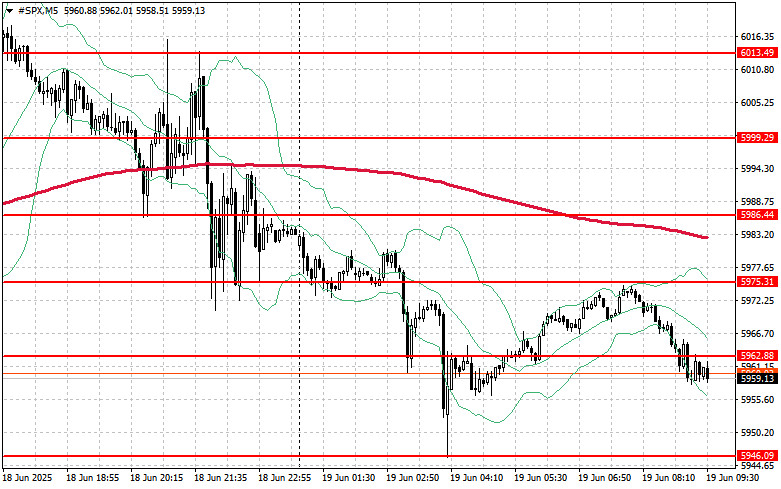At the end of the previous regular session, U.S. stock indices closed mixed. The S&P 500 fell by 0.03%, while the Nasdaq 100 rose by 0.13%. The Dow Jones Industrial Average lost 0.10%.
Today, futures indices declined as the U.S. assesses the possibility of a direct conflict with Iran, and Federal Reserve Chair Jerome Powell warned of significant inflation ahead.
Futures on the Euro Stoxx 50 dropped by about 0.5%, while U.S. indices also edged lower. The main Asian equity index fell by more than 1%. The dollar strengthened against most major currencies. Cash trading in U.S. Treasury bonds is closed on Thursday due to a U.S. holiday.
Market sentiment turned more cautious after reports emerged that senior U.S. officials are preparing for a possible strike on Iran in the coming days. Markets were already on edge following the Fed's downgrade of this year's growth projections and a forecast of higher inflation, highlighting how tariff-related uncertainty complicates the central bank's efforts to ease policy.
Geopolitical tensions combined with macroeconomic uncertainty create a challenging environment for investors. A potential military conflict in the Middle East could further raise oil prices, disrupt global supply chains, and reduce overall risk appetite. At the same time, the higher inflation forecast by the Fed casts doubt on the prospects for further interest rate cuts. If the central bank is forced to stick to a tighter monetary policy, it could negatively impact economic growth and corporate earnings. Under such conditions, investors are advised to remain cautious and diversify their portfolios. Safe-haven assets such as gold and U.S. Treasury bonds may serve as a refuge during periods of uncertainty. It is also important to closely monitor developments in the Middle East and Fed officials' comments to respond promptly to changes in market conditions.
"At the moment we are cautious, focusing on asset classes that are less correlated with interest rates and less dependent on actions by the U.S. president," analysts at Nomura stated.
Yields on Japanese bonds declined across most maturities after a strong auction and reports that the Ministry of Finance is considering reducing the issuance of super-long bonds starting in July this year.
Today, the Bank of England is expected to keep interest rates at 4.25% and signal that it will maintain its "one cut every second meeting" approach.
In the commodities market, oil fell after a volatile trading week as attention shifted to whether President Donald Trump will draw the U.S. into the Israel-Iran conflict. Gold stabilized after a decline in the previous session. "Direct U.S. involvement in an attack on Iran will almost certainly trigger a sharp spike in oil prices," analysts at Straits Investment said. "Such a spike would worsen global inflation, complicating central banks' efforts—like those of the Fed—to manage it and potentially delaying rate cuts."
Trump has spent several days publicly mulling over a strike on Iran, which has been at war with Israel for nearly a week. On Wednesday, he told reporters at the White House that he prefers to make a "final decision a second before it happens," given the volatile situation in the Middle East.
As for the technical outlook on the S&P 500, buyers' primary task today will be to break through the nearest resistance at $5962. This would support further gains and open the path toward the next level at $5975. Gaining control over $5986 is also a priority for bulls, as it would strengthen their position. In the event of a downward move driven by reduced risk appetite, buyers must assert themselves around $5946. A break below this level would quickly push the index back to $5933 and potentially open the door to $5921.














